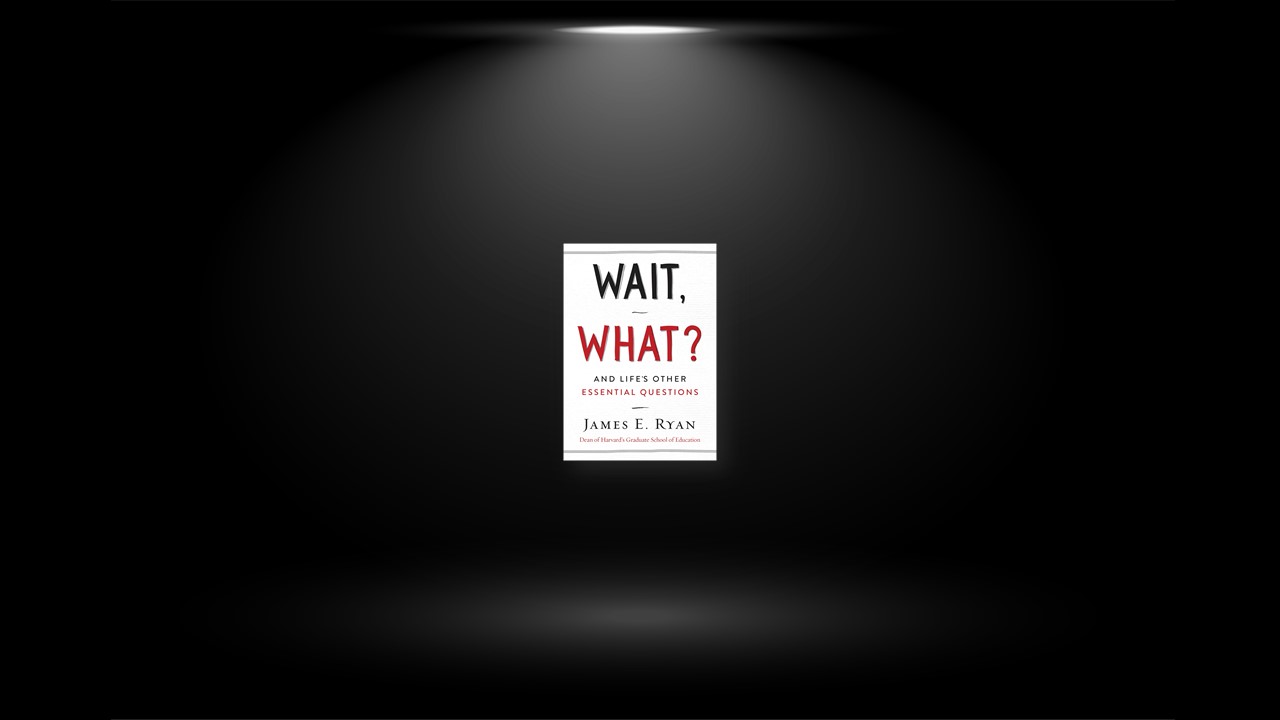Wait, What?
It is especially worth remembering in difficult situations, whether at home or at work. When faced with difficult conversations or emotionally charged situations, it is always a challenge to pause to ask if you have all of the facts you need to draw fair conclusions. It is easy—too easy—simply to react, often passionately and often based on assumptions rather than facts. Reminding yourself to ask “Wait, what?” is a way to guard against jumping too quickly to conclusions.
Asking “Wait, what?” not only helps clarify your own thinking, it can also help others do the same. For this reason, the author found it is useful as a parent to turn the table on his kids and pose the “Wait, what?” question to them. For the parents reading this book, you know that your kids can sometimes engage in what we might charitably call faulty reasoning. They might underestimate the risks or costs involved in an unsupervised adventure with friends. They might underestimate the amount of time it will take to complete a task. More seriously, they might, because of insecurity, misjudge their own place in the world and fail to see their strengths or attractiveness to others.
Adults are prone to the same mistakes. Those who lack confidence, for example, routinely make all sorts of faulty assumptions and poor inferences, assuming that they lack the competence, charisma, or talent to succeed in their careers or relationships. When your kids, friends, or other family members underestimate themselves, asking them a version of “Wait, what?” can help reveal those faulty assumptions and inferences, which can then be the primary focus of the conversation.
Indeed, you can then follow up with a version of the second essential question—“I wonder why you believe that about yourself?”—to encourage your friends or relatives to reassess their thinking. These conversations are not always easy, but they are as essential as the questions that encourage them.
I Wonder . . . ?
Albert Einstein, in a classic humble brag, once remarked: “I have no special talents. I am only passionately curious.” The first half of that statement was surely false, while the second half was undoubtedly true. Einstein was passionately curious about the world around him, both seen and unseen. “The important thing,” he observed, “is to not stop questioning. Never lose a holy curiosity.”
Curiosity begins with asking “I wonder why?” When children first encounter the world, this is the question foremost on their minds. “Why?” is their go-to question and makes up an inordinate part of their daily conversations. For whatever reason, most people tend to become less curious about the world as they age. It may be that their curiosity was not sufficiently encouraged by parents or teachers, who can become weary of the “why” question. The logistics of life can also crowd out curiosity, as simply getting through the day presents its own challenges for adults. Regardless of the reason, it is the exceptional adult who has retained a child’s innate curiosity about the world around her.
If you commit to asking “I wonder why?” you can prod yourself to remain curious. Even if others get tired of hearing it or cannot answer the question, you should never stop posing it to yourself. This doesn’t mean that you should give up your job or spend all of your time daydreaming. This only suggests that you take the time to look around you—whether at the people near you or your physical surroundings—and remember to ask “I wonder why?”
Couldn’t We at Least . . . ?
asking “Couldn’t we at least . . . ?” is a good way to get unstuck. It is a way to get past disagreement to form some consensus, as in, “Couldn’t we at least agree?” It’s also a way to get started even when you’re not entirely sure where you will finish, as in: “Couldn’t we at least begin?” No matter its specific form, asking questions that begin with “Couldn’t we at least . . . ?” is the way to make progress.
To begin, asking “Couldn’t we at least agree?” is a way to find common ground. The key to maintaining healthy and productive relationships is consensus—whether in politics, business, marriage, or friendship. Asking “Couldn’t we at least agree?” especially in the midst of an argument, is a good way to pause, step back, and look for some areas of agreement. After taking a step back and finding some consensus, you might have just what you need to take two steps forward, which is just how progress often works: one step back, two steps forward.
Seeking common ground is especially important today. The explosion of information fueled by the internet and social media should in theory help bring us into contact and engagement with ideas, facts, and beliefs that challenge our own, which in turn should help us moderate our views and keep an open mind. In reality, the opposite is happening.
Studies of social media, Facebook in particular, show that we are creating virtual gated communities, where those with like-minded views only share information that confirms their beliefs. Traditional media, meanwhile, increasingly cater to segments of the population. Conservatives watch Fox News; liberals watch MSNBC. Both groups find confirmation for their existing opinions. Our virtual worlds are becoming so segmented that we can even choose from different broadcasts of the same sporting event—one that favors the home team or one that favors the visiting team. More and more, we can choose to see only what we want to see.
How Can I Help?
Asking how you can help is an effective way of nudging others to identify, express, and confront their own problems. This is sometimes understandably hard to do, as Atul Gawande describes movingly in Being Mortal, in which he recounts the difficult choices advanced cancer patients must make about their own care. Because facing your own mortality is indescribably difficult, and because doctors naturally want to save patients, it is hard for doctors and patients to have candid discussions about the end of life. But as Gawande points out, cancer patients and their families most need someone to help guide them with candor and compassion. It occurred to
when reading this book that if doctors asked the patients how they could help, before simply pointing out all of the various interventions they could perform, they would in a way force the question, which only the patient can answer: What do you want to do? How do you want to spend what may be your last months of life? How do you want to make that decision—what information would be useful, for example, and who else would you like to include in the conversation?
Asking how you can help is equally effective in less dire circumstances, though for similar reasons. If you ask others how you can help, you are inviting them to take some ownership of their own problems. For this reason, it is a useful question to ask friends, family, and colleagues.
What Truly Matters?
The fifth and final essential question asks, “What truly matters?” This is the question that can just as effectively guide you through a meeting with colleagues as it can guide you through the biggest decisions in your life. It forces you to get to the heart of issues at work or school, and to the heart of your own convictions, beliefs, and goals in life. It’s the question that can help you separate the truly important from the trivial and can help you maneuver through the minutiae in pursuit of the momentous.
Asking yourself and others what truly matters is equally useful in the workplace or at school. It enables you to cut through distractions, tangents, and irrelevant details and to stay focused on the real and important tasks that have to be completed. Think of the nurse who suggested calling the attending physician, or the attending physician himself, who within minutes knew exactly what the situation required. Both the nurse and doctor had clearly asked themselves a version of “What truly matters?” as they sized up the situation before them.
Asking yourself “What truly matters?” before your memorial is written is a good way to take stock of your life, and for that reason it’s a good question to ask each New Year. If you are lousy at keeping your annual resolutions, substituting a question for a resolution might not be a bad strategy. The key is to get beyond simply identifying the categories or topics that matter to you and to think through what is going well, what could go better, and why.
This question won’t just help you get to the bottom of an issue or a problem. It will also help you get to the heart of your life.


